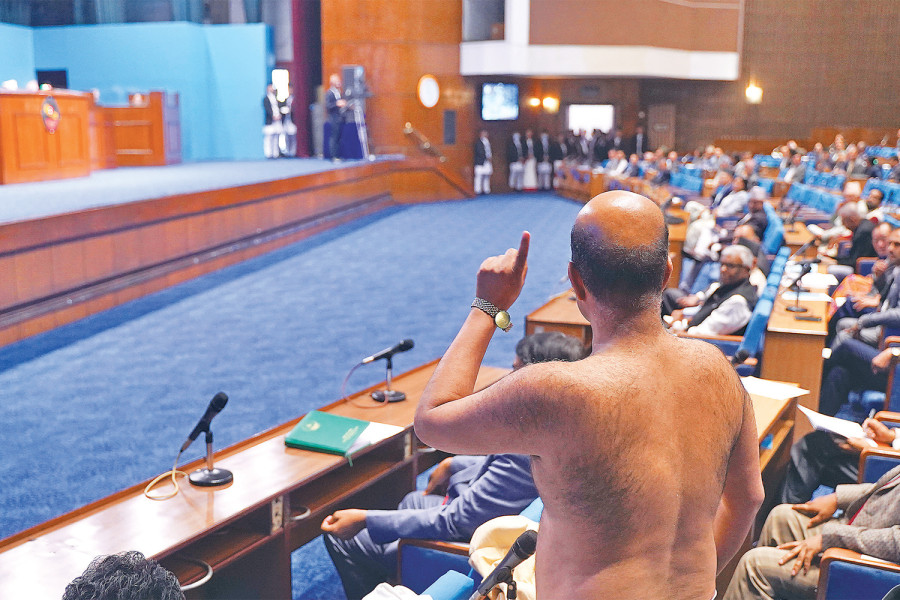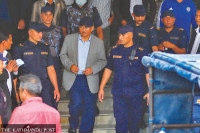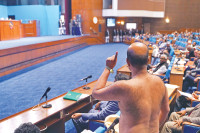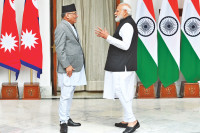Politics
Yearender 2023: All talk and no work in Parliament
While Parliament has failed to give full shape to all the committees, the panels that got their shape and leadership have not been able to create any optimism either.
Thira Lal Bhusal
The House of Representatives elected in November 2022 started its work a year ago, commencing its meeting on January 9.
But the legislature has nothing substantive to show for the last 12 months.
The federal parliament has been unable to even give full shape to all its committees, let alone function effectively, even 13 months after the election of the House of Representatives.
One of the two joint committees—the committee to monitor and evaluate the implementation of the Directive Principles, Policies and Obligations of the State–of the Parliament is yet to be formed. The hearing committee, the other joint panel of the lower and upper houses, is yet to get the committee chairperson.
In the absence of the chair, the oldest member of the committee Pashupati Shamsher Rana has been chairing its meetings for months. Chairing committee meetings by the oldest member of the panel is envisioned only as a stopgap measure until its chair is elected.
Spokesperson of the parliament secretariat Ekram Giri said some of the parties are yet to recommend names of lawmakers to represent in the committee. “The full House should be in session to form a committee. The panel may get its shape once the winter session commences and all the parties recommend names of lawmakers from their respective parties.”
The election of the chair may still be under discussion among cross-party leaders, he said.
The lower house failed to gather momentum right from the beginning. Its first meeting was convened on January 9, 2023, over one and a half months after the polls.
It took four months to form 10 thematic committees under the House of Representatives. It was only after nine months of the general election that the lower house elected chairs of the thematic committees, which are considered the workshops of the House, in the last week of August.
While the parliament [essentially the political parties] has failed to give full shape to all the committees, the panels that got their shape and leadership have also not been able to create any optimism either.
As the committees began their work, they started to court controversy and repeated the same mistakes that have marred the legislature for years.
Lawmakers and committee chairs are often criticised for starting probes into the same issue by multiple committees at the same time and issuing contradictory directives to the implementing agencies.
This Parliament couldn’t prove itself different. It is stuck in the mire of the same mistakes.
When Malaysia’s Axiata Group, the parent company of Ncell, announced its exit from Nepal in November last week, its decision drew widespread criticism. Then, one House committee after another started discussions on the same issue. As of Thursday, four thematic committees of the lower house have started probes over the matter. Officials and experts fear that the involvement of multiple committees and the issuance of different directives on the same issue may cause loss to the country.
The involvement of multiple committees has laid the ground for doubts about the intention. Six years ago, the same telecom company Ncell had benefited from the same tendency of parliamentary committees. At the time, the concerned agencies were sharply divided over whether Ncell should get the licence to start 4G internet service.
The Public Accounts Committee had just directed the Ministry of Information and Communications and the Nepal Telecommunications Authority not to allow the telecom company to introduce 4G and other services until it clears its capital gains tax (CGT).
The Development Committee and the Finance Committee of the House also intervened in the matter.
The Development Committee came forward and cleared the way for the licence, contrary to the directives from the Public Accounts Committee (PAC). Then, the company expanded its business citing the Development Committee’s decision even as the PAC was against it.
Four months ago, the 10 thematic committees started their work full-fledged after they got their chairs. Almost all the committees are now active but hardly any of them has done any substantive investigation.
Dismal output
While the thematic committees have failed to produce any notable result, the first year of the full House remained equally discouraging in terms of its output.
Except for endorsing the annual budget bills that are a routine task of the parliament, the country’s highest law-making body promulgated only one law, which was on criminalising usurious practices in lending, in the entire year.
The federal legislature wasted two sessions without formulating sufficient laws even as some important bills have been pigeonholed for a long time. For instance, the Bill to amend the Enforced Disappearances Enquiry, Truth and Reconciliation Commission Act, and the Bill to amend the Anti-money Laundering and Business Promotion Act have failed to pass through the legislature.
While thousands of conflict victims are still awaiting justice, lawmakers and politicians have failed to amend the law defining whether the violence committed by both the then-rebel Maoists and security forces was amnestiable or non-amnestiable.
Likewise, the country is risking its image in the international community for failing to pass the bill to amend the anti-money laundering act.
The lower house has shelved some other bills even after the National Assembly endorsed them long ago.
According to Numraj Khanal, chief of the bill section of the National Assembly, the lower house has yet to endorse 15 bills that the upper house endorsed and forwarded to the lower chamber. Ten of them have remained in the lower house for a long time.
Five bills had been inactivated with the tenure completion of the House of Representatives last year.
According to a lawmaker, the upper house has failed to endorse the immigration bill as the home minister hasn’t given his time to the chamber. The line minister has to appear in the House meeting and answer the queries before tabling the motion to endorse the bill from the floor.
According to Spokesperson Giri, the bills received from the upper house are under discussion in the related thematic committees.
Continued disruption
One of the chronic problems of Nepal’s Parliament has been frequent and prolonged obstructions of the House proceedings. People are dismayed when such months-long disruptions yield no substantive result except for forming one more commission or a probe panel. Parties were found to be doing the exact same this year too.
The main opposition the CPN-UML obstructed parliament proceedings for a month since July 26 demanding the formation of a powerful commission to investigate the increasing trend of gold smuggling in the country. It ended only after the government decided to form a neutral and independent body to conduct a thorough inquiry into repeated cases of gold smuggling.
Before that, opposition parties including the UML and the Rastriya Prajatantra Party disrupted House meetings to protest Prime Minister Pushpa Kamal Dahal’s remarks that Sardar Pritam Singh had frequently visited New Delhi to make Dahal prime minister.
At the end of the year, a dispute emerged over the appointment of the general secretary of the parliament secretariat. The dispute has resulted in a tussle between President Ramchandra Paudel and the heads of the two chambers of the Parliament. Speaker Devraj Ghimire and National Assembly chair Ganesh Timilsina recommended a parliament secretary Padma Prasad Pandey for the post of general secretary earlier this month. But President Paudel has halted the appointment so far questioning the credentials of the candidate.
Larger consequences
The ineffective and lackadaisical House functioning may have larger consequences. Within a few years after the restoration of the parliamentary system in 1990, the then CPN (Maoist) party led by present Prime Minister Pushpa Kamal Dahal had launched a political movement against the parliamentary system saying that the country wouldn’t progress under the system. They cited its shortcomings, ineffective delivery and anomalies of the parliamentary practices. Many fear inefficiency of the present parliament may invite similar instability in the country.
Krishna Khanal, a political science professor, expresses his frustration in witnessing political parties making the parliament dysfunctional. He said Nepal’s politicians failed to make the parliamentary system effective based on its strength. “Unlike in the presidential system, the head of the government in our system is elected from Parliament; therefore, the prime minister is accountable to the House and this is the strength of this system” Khanal told the Post. “But our politicians don’t want to strengthen our legislature.”
Professor Khanal says thematic committees, through their role of scrutiny over the functioning of government agencies, can become instrumental in making the government accountable. “But the committees haven’t been able to function as per that spirit,” he said. “Mainly senior politicians are responsible for rendering the Parliament ineffective.”
He said the current tendency may also pose a threat to the political system in the present context as well. “Because the public trust in the parliament has already begun eroding.”




 8.26°C Kathmandu
8.26°C Kathmandu















